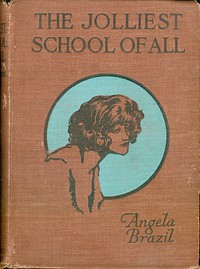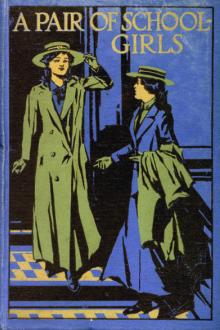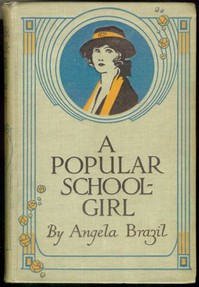The Jolliest School of All by Angela Brazil (top ebook reader .TXT) 📗

- Author: Angela Brazil
Book online «The Jolliest School of All by Angela Brazil (top ebook reader .TXT) 📗». Author Angela Brazil
"Antonio and Dominica say that dwarfs live in the caves down there," remarked Peachy. "Half the people in the town believe in them, but they're too afraid to go and see because the dwarfs have 'the evil eye,' and would bring them bad luck."
"What superstitious nonsense!" laughed Rachel. "How can they make up such stuff?"
"Not altogether such nonsense as you think," corrected Miss Bickford, who was a student of archæology; "indeed I find it intensely interesting. It's a case of survival of tradition. A few thousand years ago no doubt a race of little short dark Stone Age men actually lived in those caves, and took good care[74] to avenge themselves on any of the taller, stronger tribes who interfered with them and tried to push them out of their territory. The remembrance of them would be handed down long after they had become extinct, and, of course their doings were exaggerated, and their cunning tricks were set down to magic. Just as the prehistoric monsters lingered as dragons and firedrakes, so the small early inhabitants of Europe have passed into dwarfs and brownies and pixies. If anybody cared to dig in those caves I dare say flint weapons might be found. It's a chance for the local antiquarian society if they'd only take it."
Leaving the gorge the party turned up a steep and very narrow alley between walls nine or ten feet high. At the tops of these walls were raised gardens planted with orange and lemon trees, whose fruit, in all stages of green, gold, and yellow, overshadowed the path. Across some of them were erected shelters of reeds or plaited grass, to prevent too quick ripening, but in some of the orchards the crop was ready, and workers were busy with ladders and baskets gathering their early harvests. It was a picturesque route, for the sides of the deep walls were covered with beautiful maidenhair ferns, and over the tops hung geraniums or clumps of white iris or purple stocks or clusters of little red roses. Here and there, at a corner, was a wayside shrine with a faded picture of the Madonna, and a quaint brass lamp in front, and perhaps some flowers laid[75] there by loving hands; dark-eyed smiling little children were playing about and giving each other rides in home-made hand-carts, and at one point the girls stood aside to let pass a donkey so loaded with tiny bamboo trees that it looked a mere moving mass of green.
At length the deep alley between the orange orchards gave way to a different scene. They had been climbing steadily uphill, and now found themselves above the fruit zone and among the olive groves. The high walls had disappeared, and the path ascended by a series of steps. Gray olive trees were on either side, and on the bordering banks grew lovely wild flowers, starry purple anemones, jack-in-the-pulpit lilies, yellow oxalis, moon-daisies, and the beautiful genista which we treasure as a conservatory plant in England. As it was country the girls were allowed to break rank, and keenly enjoyed gathering bouquets; they scrambled up the banks, vying with one another in getting the best specimens. The view from the heights was glorious: below them stretched the gray-green of the olive groves, broken here and there by the bright pink blossoms of a peach tree; the white houses of Fossato gleamed among the dark glossy foliage of its orange orchards, and beyond stretched the beautiful bay of Naples, with its sea a blaze of blue, and old Vesuvius smoking in the distance like a warning of trouble to come.
It was at this point of the walk that Irene, foolish,[76] luckless Irene, made a fatal mistake, and, as Miss Bickford afterwards told her, "wrecked the whole excursion and spoiled everybody's pleasure." She beckoned Lorna and ran up a hill to obtain a higher vantage ground, then, instead of descending by the route she had come, she insisted upon taking a short cut to rejoin the path and catch up with the rest of the party. Now neither Lorna nor Irene was aware that the mountain was a network of many paths leading to little vineyards and gardens, and that when they ran down the opposite side of the slope they were striking a fresh alley, altogether different from the one along which Miss Bickford was leading her flock. For quite a long way the two girls walked on, thinking they were in advance of the others and had stolen a march upon them. Then they sat down and waited, but nobody came. It was a considerable time before it dawned upon them that they were separated from the rest of the party.
"We've come wrong somehow," said Lorna, in much consternation.
"What had we better do?"
"I don't know."
"Perhaps they're not far off. I'll try if I can make them hear."
"I wouldn't shout," objected Lorna, but she was too late, for Irene was already letting off her full lung power in a gigantic coo-e-e. It had a totally different effect from what she anticipated. No schoolgirls with Villa Camellia hats made their ap[77]pearance, but some rough looking Italian youths scrambled over a fence and came sniggering towards them. Their manner was so objectionable and offensive that the girls turned and ran. They pelted down the path anywhere, quite oblivious of the direction they were taking, and, as a matter of fact, branching yet farther away from their original route. They could hear footsteps and giggling laughter behind, and they were growing extremely terrified when to their immense relief they saw in front of them an elderly peasant woman coming from the town. She had a bright yellow handkerchief round her neck and carried on her head a big basket containing flasks of oil, loaves of bread, and some vegetables. She stopped in some astonishment as Lorna and Irene rushed panting up to her, then glimpsing the lads she seemed to grasp the situation, and called out angrily to them in Italian, whereupon they promptly and rapidly disappeared. As she had reached the gateway of her own garden she motioned the girls to enter, and they gladly availed themselves of the opportunity to seek sanctuary. A large archway led into a paved courtyard, on one side of which was a little brown house, and on the other a small chapel, quite a picture with its quaint half-Moorish tower and two large bells. Their new friend seemed to be the caretaker, for she escorted them inside to show them, with much pride, an altar-piece attributed to Perugino and some ancient faded frescoes of haloed saints. She gave them a peep into her house[78] too, and they were deeply interested to see the unfamiliar foreign home, not comfortable according to British or American ideas of comfort, but with a certain charm of its own. There was a big dark room on the ground floor with an orange press, various agricultural implements, and numberless baskets for gathering fruit; there was a bare kitchen with a wood fire and a table spread with cups and dishes; then up a winding stair was a bedroom with walls colored sky blue, and a veranda that looked down over a glorious orange orchard.
"Oh, I'd adore to go out there!" said Irene, pointing to the path that led between the fruit-laden trees, and their hostess evidently divined her meaning, for she not only led her guests into the garden, but fetched a ladder, climbed a tree, and plucked each of them a whole cluster of oranges surrounded by a bunch of leaves.
The girls were so delighted with their entertainment in this Italian cottage that they hardly wished to tear themselves away, yet a vision of Miss Bickford's reproachful face began to hover before their eyes, and Lorna at last suggested that they must be moving.
"I hope those abominable boys aren't waiting about anywhere outside," shivered Irene.
The same thought seemed to have struck their hostess, for she called an elderly man, evidently her husband, who was pruning vines, and began a catechism as to where her visitors lived. Lorna replied[79] as well as her knowledge of Italian allowed, and at the mention of the Villa Camellia the pair nodded in comprehension. After a brief conversation with his wife in an undertone the old man offered himself as guide, and undertook to escort the truants safely back to school again, a proposal which they thankfully accepted. It would indeed have been difficult for them to find their own way among the various interlacing paths, and they were particularly glad to have his protection against possible ragazzi. There was tremendous trouble waiting for them at the Villa Camellia. Poor Miss Parr had collapsed almost into hysterics, and Miss Bickford with two other teachers had returned to the hillside on a further search, while Miss Rodgers was communicating by telephone with the Fossato police station, and offering a reward for any news of their whereabouts. Irene had thought the principal could be stern, but she never knew how her eyes could flash before that interview in the study. Both girls came out quaking like jellies and weeping for all to hear.
"Did you catch it hot?" inquired Peachy, sympathetically linking arms with the truants.
"Rather! It isn't the punishments so much, it's that she made us so ashamed."
"Our parole won't be trusted till after half-term."
"We didn't mean to run away."
"It was really quite an accident."
"Cheer up!" consoled Peachy. "Miss Rodgers cuts like a steel knife, but she doesn't bear grudges.[80] I will say that for her. With some teachers you'd never hear the last of it, but once you've worked off your impositions you'll be quite in favor again. Whatever possessed you to go and do it though?"
"Just our wretched bad luck, I suppose," said Irene, rubbing her eyes as she turned up the passage and deposited her confiscated cluster of oranges, as directed, in the pantry.[81]
CHAPTER VII Lorna's EnemyFor the next two weeks Irene and Lorna were strictly "gated," a great deprivation, for it would have been their turns to go shopping with Miss Morley, and Irene at least was anxious to sample some of the quaint wares spread forth so temptingly in the Fossato stores. With the exception of church-going they did not have a chance to step outside the grounds of the Villa Camellia. The Sunday expedition came as a welcome relief to break the monotony. The school liked the little British church at Fossato. It was so utterly different from anything to which they had been accustomed in England or America. To begin with it was not an ecclesiastical building at all, but simply a big room in the basement of the Hôtel Anglais. The walls had been exquisitely decorated by a French artist with conventionalized designs of iris in purple and gold, and through the windows there was a gorgeous peep over the bay. The girls used to exercise much maneuvering to secure the seats with the best view, and somehow that bright stretch of the Mediterranean seemed to blend in as part and parcel of all the praise and thanksgiving that was being offered.[82]
Punctually at twenty minutes to eleven on Sunday mornings the fifty-six pupils and the seven mistresses would leave the great gate of the Villa Camellia and march into the town, along the esplanade under the grove of palm trees, then through the beautiful sheltered garden of the Hôtel Anglais, where many exotic flowers and shrubs were blooming and the white arum lilies were like an Easter festival, to the doorway, under the jessamine-covered veranda, that led to the Eglise anglaise et américaine. The school practically made half the congregation, but there were visitors from the various hotels, and a sprinkling of British residents who had houses at Fossato. When the service was over there followed a very pleasant quarter of an hour in the piazza of the hotel; the clergyman and his wife would speak personally to many of the girls, and any of the pupils who met friends were allowed to talk to them. Fossato was a popular week-end resort from Naples, so relatives often turned up on Sundays and there were many joyous reunions. Kind little Canon Clark and his small bird-like wife were great favorites at the Villa Camellia. They were always invited to school functions, and each term the girls, in relays of about ten at a time, were offered hospitality at the "Villa Bleue," a tiny dwelling that served as parsonage for the British chaplain. To go to tea at the dear wee house—color-washed blue, and with pink geraniums in its window-boxes—was considered a treat, and Irene and Lorna looked very glum indeed when[83] Miss Rodgers kept severely to their punishment, and substituted Agnes and Elsie for





Comments (0)